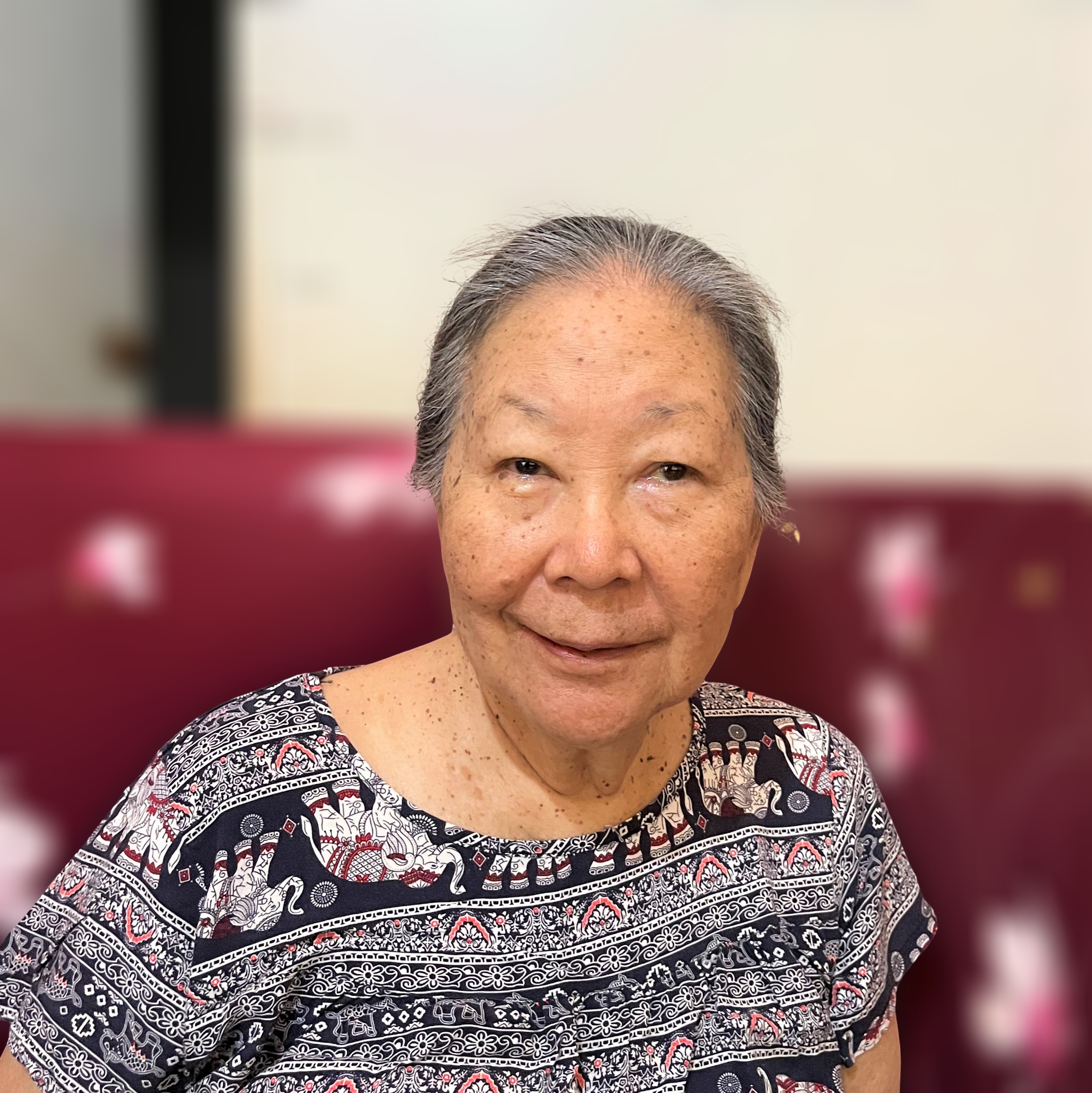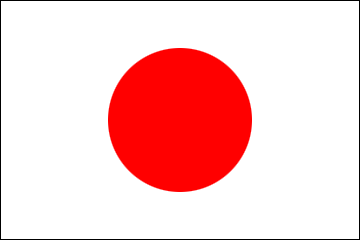~“Nikkei”~ Interview Series Vol. 34 Ms. Keiko Nakamura Bedor
2025/10/7

Ms. Keiko Nakamura Bedor (76 years old) is a second generation Japanese-Palauan or Nikkei. She was born in 1949, to her Palauan mother, Ms. Aliil Betok Nakamura of Peleliu State and Japanese father, Mr. Zenshichi Nakamura of Mie Prefecture. Mr. Zenshichi worked as a phosphate miner in Angaur State where he met Ms. Aliil Betok, they eventually got married and moved to Peleliu State. Ms. Keiko Nakamura, the youngest among her eight siblings, is now the only one still living. Her brothers and sisters, Mr. Hiroshi Nakamura, Mr. Daiziro Nakamura, Mr. Tosiwo Nakamura, Mr. Mamoru Nakamura, Mr. Kuniwo Nakamura, Ms. Hisae Nakamura, and Ms. Kimie Nakamura have all passed. She also has four half-siblings from her father’s previous marriage. She married the late Mr. Roman Bedor, a well-known lawyer in Palau, and is blessed with three children and five grandchildren. Her father, Mr. Zenshichi Nakamura returned to Japan with their family after World War II. At that time, Ms. Nakamura had not been born yet. The Nakamura family lived in Japan for about two years before returning to Palau. A few years after they returned and settled in Palau, Ms. Keiko Nakamura was born.
Her father worked as a boat builder and purchased land for their family in the center of Koror, where he built their home. Ms. Nakamura does not speak Japanese, as her father had learned the Palauan language and communicated with the family mostly in Palauan.
Ms. Nakamura said of her father, “He was a kind and gentle man who never raised his voice or his hand to his children.” One important lesson she had learned from him was to never take more food than she could eat, as no one should have had to finish someone else's leftovers. She had been taught to eat every grain of rice on her plate, leaving nothing behind. Her father had also emphasized the importance of showing respect to her mother.
Ms. Nakamura received her primary education at Koror Elementary School and completed her secondary studies at Palau High School. Following her graduation, she left Palau to pursue higher education at the University of Guam. She studied there for two years but was compelled to return to Palau in 1970 following the passing of her father. Ms. Nakamura chose to remain in Palau to support her mother. She began working in the administration department of Belau Transfer & Terminal Company (BTTCo), a business that her family would later manage as the majority shareholder. Ms. Nakamura remained with BTTCo from 1973, until her retirement.
Ms. Nakamura visited Japan only twice in her life. The first time was when she was a baby, around two years old, during a family trip to visit her father’s relatives in Mie Prefecture. She returned in 1996, when her brother, former President Kuniwo Nakamura, took her and other family members on a visit.
Ms. Nakamura recalled that during their visit to Mie Prefecture, her aunt gave her a tour of the family home and pointed out the exact room where she had looked after Ms. Nakamura as a baby during her first trip to Japan. The family also visited their ancestral cemetery to pay respects. While there, their Japanese relatives informed them that the cemetery was located on land owned by the Nakamura family.
They visited Ise Jingu (Ise Shrine) in Mie Prefecture and also traveled to Tokyo and Osaka. A friend of her brother, Mr. Kuniwo Nakamura,took her and the children to an amusement park and also accompanied them to Osaka via the subway and bullet train on their return trip to Tokyo. Ms. Nakamura’s favorite Japanese food is sushi. In Tokyo, they discovered a street market near their hotel that offered a wide variety of food, including sushi. She was delighted to find this place, as it was more affordable than the food at the hotel. They visited Japan around August, so she regrets not having the chance to see the cherry blossoms.
She hasn’t been able to return to Japan in recent years, but she has always hoped to go back. She planned to visit Japan with her late husband, Mr. Roman Bedor but they were never able to make the time.
Although she didn’t travel to Japan often, her older sister, Ms. Hisae, who knew how to speak Japanese, maintained communication with their relatives in Mie prefecture. Her cousin visited frequently to see her siblings and spend time with the Nakamura family in Palau. On one visit, their cousin brought the certificate of land title for the family land that was being used as a cemetery in Mie Prefecture. In Japanese tradition, familial assets are typically inherited by the male family member`s children. The cousin brought the certificate of land title to transfer ownership to the Nakamura descendants in Palau, but her older siblings, while grateful, kindly declined. They told their cousin that they lived in Palau and were doing well, and that they preferred the land in Japan be given to the relatives who still lived there to manage. Ms. Nakamura told us about that moment and said the cousin who had come from Japan was tearful with gratitude and deeply moved by the kindness they had shown him. Her older sister, Ms. Hisae, has since passed away and communication with their relatives in Japan have stopped as no one knows how to speak Japanese.
She is appreciative of the support from the government of Japan to Palau and hopes that the relations between both countries will continue to flourish for many years to come.
Her father worked as a boat builder and purchased land for their family in the center of Koror, where he built their home. Ms. Nakamura does not speak Japanese, as her father had learned the Palauan language and communicated with the family mostly in Palauan.
Ms. Nakamura said of her father, “He was a kind and gentle man who never raised his voice or his hand to his children.” One important lesson she had learned from him was to never take more food than she could eat, as no one should have had to finish someone else's leftovers. She had been taught to eat every grain of rice on her plate, leaving nothing behind. Her father had also emphasized the importance of showing respect to her mother.
Ms. Nakamura received her primary education at Koror Elementary School and completed her secondary studies at Palau High School. Following her graduation, she left Palau to pursue higher education at the University of Guam. She studied there for two years but was compelled to return to Palau in 1970 following the passing of her father. Ms. Nakamura chose to remain in Palau to support her mother. She began working in the administration department of Belau Transfer & Terminal Company (BTTCo), a business that her family would later manage as the majority shareholder. Ms. Nakamura remained with BTTCo from 1973, until her retirement.
Ms. Nakamura visited Japan only twice in her life. The first time was when she was a baby, around two years old, during a family trip to visit her father’s relatives in Mie Prefecture. She returned in 1996, when her brother, former President Kuniwo Nakamura, took her and other family members on a visit.
Ms. Nakamura recalled that during their visit to Mie Prefecture, her aunt gave her a tour of the family home and pointed out the exact room where she had looked after Ms. Nakamura as a baby during her first trip to Japan. The family also visited their ancestral cemetery to pay respects. While there, their Japanese relatives informed them that the cemetery was located on land owned by the Nakamura family.
They visited Ise Jingu (Ise Shrine) in Mie Prefecture and also traveled to Tokyo and Osaka. A friend of her brother, Mr. Kuniwo Nakamura,took her and the children to an amusement park and also accompanied them to Osaka via the subway and bullet train on their return trip to Tokyo. Ms. Nakamura’s favorite Japanese food is sushi. In Tokyo, they discovered a street market near their hotel that offered a wide variety of food, including sushi. She was delighted to find this place, as it was more affordable than the food at the hotel. They visited Japan around August, so she regrets not having the chance to see the cherry blossoms.
She hasn’t been able to return to Japan in recent years, but she has always hoped to go back. She planned to visit Japan with her late husband, Mr. Roman Bedor but they were never able to make the time.
Although she didn’t travel to Japan often, her older sister, Ms. Hisae, who knew how to speak Japanese, maintained communication with their relatives in Mie prefecture. Her cousin visited frequently to see her siblings and spend time with the Nakamura family in Palau. On one visit, their cousin brought the certificate of land title for the family land that was being used as a cemetery in Mie Prefecture. In Japanese tradition, familial assets are typically inherited by the male family member`s children. The cousin brought the certificate of land title to transfer ownership to the Nakamura descendants in Palau, but her older siblings, while grateful, kindly declined. They told their cousin that they lived in Palau and were doing well, and that they preferred the land in Japan be given to the relatives who still lived there to manage. Ms. Nakamura told us about that moment and said the cousin who had come from Japan was tearful with gratitude and deeply moved by the kindness they had shown him. Her older sister, Ms. Hisae, has since passed away and communication with their relatives in Japan have stopped as no one knows how to speak Japanese.
She is appreciative of the support from the government of Japan to Palau and hopes that the relations between both countries will continue to flourish for many years to come.
